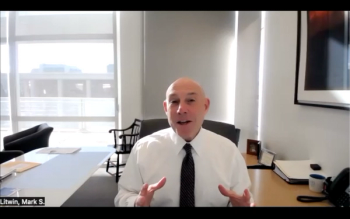
You chose to be a urologist, now count your blessings
"The next time you think about what you would do instead of becoming a doctor and especially a urologist, just stop and be thankful you chose urology," writes Neil H. Baum, MD.
Dr. Baum is professor of clinical urology at Tulane University School of Medicine, New Orleans.
On more than one occasion I’ve heard doctors in the surgical lounge or lunchroom complain about the current state of American medicine and say they wouldn’t choose to become a doctor if they were to start all over again. After attending the recent AUA annual meeting in San Francisco, I was buoyed by the fact that the urologists I spoke to remain happy and content with their decision to select urology as their specialty and their life’s work.
Here are some of the reasons we should feel pleased that we chose to become urologists.
As urologists, we see the entire spectrum of age groups, from newborns to geriatric patients. We have an opportunity to care for children and their congenital problems, and we care for patients in their declining years when urologic problems are so common. We can even delve into the emotional problems of our patients and with our empathy can provide support and solutions.
Unlike some specialties, such as oncology and neurology, most of our patients do well and get better. We have at our disposal medicines, surgery, and the combination of both treatments that render our patients improved after they interact with us. The knowledge that we can solve many, if not most, of their urologic problems is very rewarding and satisfying. As a result, patients seem to hold their urologists in high esteem and are very grateful for the care we provide.
Also see:
We are fortunate that urology is a field where the patient’s problem is almost always clearly defined. For example, when a patient presents with a complaint of hematuria or incontinence, we can pinpoint the etiology and the defect and then offer a solution. Our area of medicine is not amorphous or ill-defined where the solution may be cloudy or unclear.
There’s always demand for our services, and that demand will become even greater now that the baby boomers are reaching age 65. In fact 10,000 people reach age 65 every day. That translates into a lot of work for every American urologist, as most of the aging baby boomers will eventually need our services.
Urology is broad in scope, although the organ systems we treat are relatively small. We have an opportunity to focus on a single, defined area such as urologic oncology, endourology, incontinence, andrology, or robotic surgery. Consequently, if we choose, we can become experts in a defined field or subspecialty.
Next:
The call schedule for a urologist is doable compared to that of obstetricians, general surgeons, and orthopedic surgeons. If urologists are experiencing burnout, with some reports as high as 50%, I doubt it is because of an overburdened call schedule.
Read:
Our specialty offers multiple opportunities for entrepreneurship and creativity. Most of the new devices and interventions in the field are developed by urologists. We can turn our creative juices to developing new ways of treating urologic diseases more efficiently and with less pain and discomfort. The current trend of bringing care from the hospital setting to the office setting, where the urologist is more in control of his or her schedule, has been largely advanced by our peers and colleagues.
For those urologists who wish to segue from clinical practice to non-clinical endeavors, there are numerous non-urologic opportunities such as joining the ranks of pharma, becoming a medical director for industry or a hospital, and even going into politics and creating health care policy.
Our specialty enjoys having a good sense of humor. I have never met a urologist who doesn’t have a cute story or joke to share with colleagues and patients. Maybe that’s why we are so happy with our career choice; if you are laughing, you can’t be sad.
In short, the next time you think about what you would do instead of becoming a doctor and especially a urologist, just stop and be thankful you chose urology. You have many reasons to be grateful.
Newsletter
Stay current with the latest urology news and practice-changing insights — sign up now for the essential updates every urologist needs.






